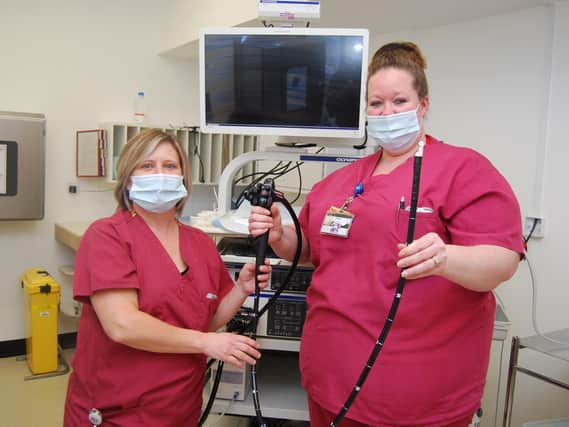Six-figure boost to help KGH reduce waits for endoscopy patients


Endoscopy patients at KGH won't have to wait as long to be seen after the hospital secured £160,000 of state-of-the-art equipment.
The trust made a successful bid to purchase additional equipment through the Department of Health and Social Care’s Adapt and Adopt programme, developed to help NHS hospitals catch-up on waiting times during the Covid-19 pandemic.
Advertisement
Hide AdAdvertisement
Hide AdThey now have an £85,000 endoscopic ultrasound probe, a piece of specialist equipment which can be added to an existing ultrasound machine to enable ultrasound of the oesophagus.
The probe is used in cancer diagnosis. KGH patients needing this procedure previously had to travel to the University Hospitals of Leicester to have it done.
The hospital also has £75,000 worth of additional and upgraded diathermy equipment, several pieces of advanced equipment which together enable the endoscopy team to use electromagnetic currents to generate heat to remove potentially cancerous bowel polyps and cauterise any bleeding or coagulate it by applying a gas spray.
Tina Brooks is Kettering General Hospital’s endoscopy service manager and is also a nurse endoscopist.
Advertisement
Hide AdAdvertisement
Hide AdShe said: “These are important pieces of equipment which will enable us to expand our capacity to treat patients and help us to further reduce our waiting times.
“The extra new equipment is very precise and faster to use and will enable us to use all five – rather than just three – of our endoscopy treatment rooms simultaneously.
“Previously we hadn’t been able to do this because of a lack of equipment.”
The ultrasound probe is used to look at tissue in the oesophagus where a lesion is found so clinicians can tell what stage a cancer is at, which helps them to decide on appropriate treatment.
Advertisement
Hide AdAdvertisement
Hide AdThe state-of-the-art diathermy equipment enables work to be done that reduces the need for major surgical operations and it can also be precisely pre-programmed to reduce any risk of human error when carrying out procedures.
Tina said: “Overall we have now managed to get our service back within national target times of urgent patients being seen within two weeks and routine cases being seen within six weeks.
“This was possible thanks to additional working by our staff, including working at weekends, and also because we already had modern facilities suitable for use during the pandemic which were provided thanks to a major upgrade of the hospital’s endoscopy unit in 2017 to 2018.
“Having these great facilities meant that we were one of the first unit’s in the country to reinstate full services to patients in June.”
Advertisement
Hide AdAdvertisement
Hide AdProviding endoscopy care during the Covid-19 pandemic has been challenging because procedures generate aerosol contamination and present a greater infection control risk.
The trust has adapted to this challenge developing safe processes including pre-operation Covid tests and isolating patients for 72 hours before procedures take place.
During the first wave of the pandemic, across the country, routine endoscopy procedures were paused. This meant some of KGH’s endoscopy staff were redeployed to A&E and the intensive care unit as part of the trust’s front-line response to the pandemic.
At present the trust is continuing to treat urgent and routine endoscopy patients during the second wave of the pandemic.